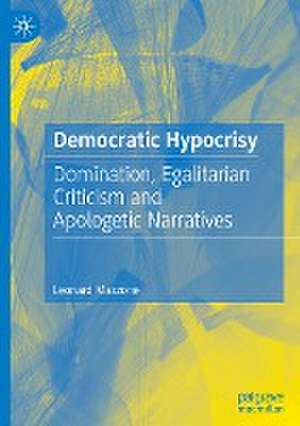Democratic Hypocrisy: Domination, Egalitarian Criticism and Apologetic Narratives
Autor Leonard Mazzoneen Limba Engleză Hardback – 30 iul 2023
Preț: 696.02 lei
Preț vechi: 818.85 lei
-15% Nou
Puncte Express: 1044
Preț estimativ în valută:
133.19€ • 139.34$ • 110.64£
133.19€ • 139.34$ • 110.64£
Carte tipărită la comandă
Livrare economică 03-17 aprilie
Preluare comenzi: 021 569.72.76
Specificații
ISBN-13: 9783031338199
ISBN-10: 3031338197
Pagini: 187
Ilustrații: XV, 187 p. 1 illus.
Dimensiuni: 148 x 210 mm
Greutate: 0.4 kg
Ediția:1st ed. 2023
Editura: Springer International Publishing
Colecția Palgrave Macmillan
Locul publicării:Cham, Switzerland
ISBN-10: 3031338197
Pagini: 187
Ilustrații: XV, 187 p. 1 illus.
Dimensiuni: 148 x 210 mm
Greutate: 0.4 kg
Ediția:1st ed. 2023
Editura: Springer International Publishing
Colecția Palgrave Macmillan
Locul publicării:Cham, Switzerland
Cuprins
Chapter 1: Introduction.- Chapter 2: Psychological and Moral Hypocrisy.- Chapter 3: Domination, Critique and Democratic Hypocrisy.- Chapter 4: Apologetic Narratives: Justifying the Unjustifiable.- Chapter 5: Conclusion: Beyond the Critique of Democratic Hypocrisy, Before Cynical Resignation.
Notă biografică
Leonard Mazzone is Research Associate in Social and Political Philosophy at the Department of Social and Political Sciences of the University of Florence, Italy.
Textul de pe ultima copertă
"Mazzone has focused our attention on an important and underappreciated topic; the way hypocrisy suppresses the complaints of the oppressed and poses a particular threat not just to our politics but to democracies as a whole. The topic could hardly be more urgent."
-- Ekow N. Yankah, Thomas M. Cooley Professor of Law at the University of Michigan, USA
Unconfessed by definition, hypocrisy is one of the most used and abused polemical categories, even today, to denounce the "masked cynicism" of certain social actors, especially when they hold public office. But has hypocrisy always been just that? Should we really always be wary of it and challenge its every manifestation? What forms of hypocrisy can we distinguish? What kind of relationship exists between hypocrisy and the lack of self-critical attitude of those who are used to challenge the conduct of others? And above all: what relationship exists between this common vice, democratic politics andthe institutional reproduction of different forms of oppression and domination? These are just some of the questions that inspire this philosophical journey back into the history of one of the most chameleonic concepts of Western culture. In Mazzone’s conception, democratic hypocrisy includes argumentative strategies used by institutional actors to refuse any kind of responsibility when their decisions, actions or roles are called into question by the protests of citizens in a democratic context. He reveals the relationship that exists between such “apologetic narratives” and the institutional reproduction of different forms of oppression and domination. Ultimately, the book urges civic vigilance against underhand wannabe authoritarians, who – as a group – are evolving to find new ways to trick people into opposing democracy.
Leonard Mazzone is Research Associate in Social and Political Philosophy at the Department of Social and Political Sciences of the University of Florence, Italy.
"Mazzone has focused our attention on an important and underappreciated topic; the way hypocrisy suppresses the complaints of the oppressed and poses a particular threat not just to our politics but to democracies as a whole. The topic could hardly be more urgent."
-- Ekow N. Yankah, Thomas M. Cooley Professor of Law at the University of Michigan, USA
Unconfessed by definition, hypocrisy is one of the most used and abused polemical categories, even today, to denounce the "masked cynicism" of certain social actors, especially when they hold public office. But has hypocrisy always been just that? Should we really always be wary of it and challenge its every manifestation? What forms of hypocrisy can we distinguish? What kind of relationship exists between hypocrisy and the lack of self-critical attitude of those who are used to challenge the conduct of others? And above all: what relationship exists between this common vice, democratic politics andthe institutional reproduction of different forms of oppression and domination? These are just some of the questions that inspire this philosophical journey back into the history of one of the most chameleonic concepts of Western culture. In Mazzone’s conception, democratic hypocrisy includes argumentative strategies used by institutional actors to refuse any kind of responsibility when their decisions, actions or roles are called into question by the protests of citizens in a democratic context. He reveals the relationship that exists between such “apologetic narratives” and the institutional reproduction of different forms of oppression and domination. Ultimately, the book urges civic vigilance against underhand wannabe authoritarians, who – as a group – are evolving to find new ways to trick people into opposing democracy.
Leonard Mazzone is Research Associate in Social and Political Philosophy at the Department of Social and Political Sciences of the University of Florence, Italy.
Caracteristici
Bisects hypocrisy’s role in political theory into the “psychological hypocrisy” of good manners Illustrates relationship between two kinds of hypocrisy and political actors and their implication for liberal democracy Discusses approaches to addressing problems of hypocrisy in the context of democratic politics
